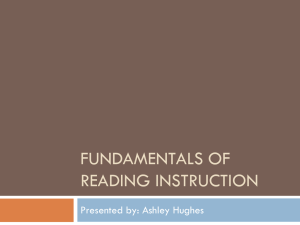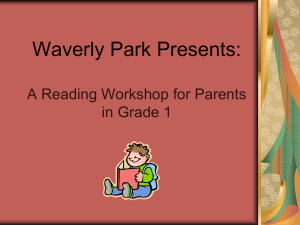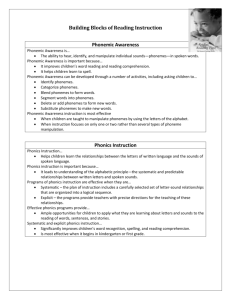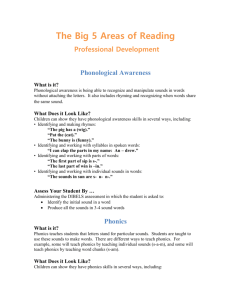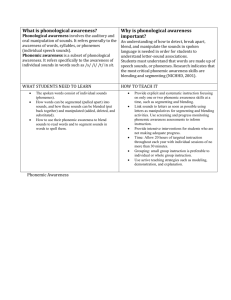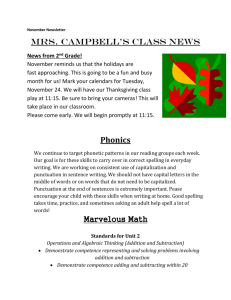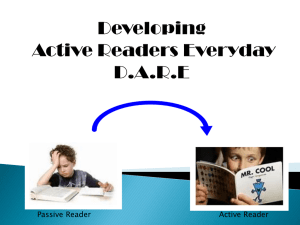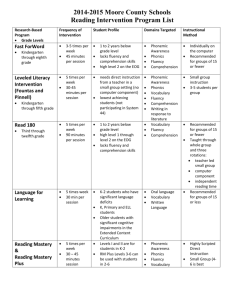Language Arts Manipulatives
advertisement
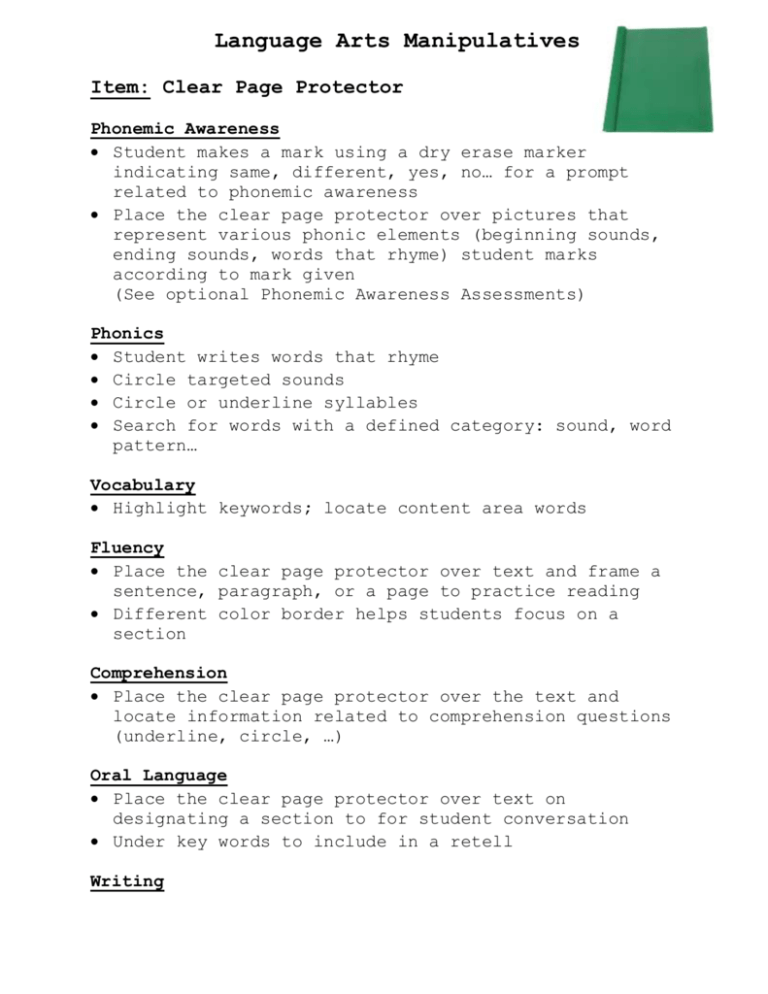
Language Arts Manipulatives Item: Clear Page Protector Phonemic Awareness Student makes a mark using a dry erase marker indicating same, different, yes, no… for a prompt related to phonemic awareness Place the clear page protector over pictures that represent various phonic elements (beginning sounds, ending sounds, words that rhyme) student marks according to mark given (See optional Phonemic Awareness Assessments) Phonics Student writes words that rhyme Circle targeted sounds Circle or underline syllables Search for words with a defined category: sound, word pattern… Vocabulary Highlight keywords; locate content area words Fluency Place the clear page protector over text and frame a sentence, paragraph, or a page to practice reading Different color border helps students focus on a section Comprehension Place the clear page protector over the text and locate information related to comprehension questions (underline, circle, …) Oral Language Place the clear page protector over text on designating a section to for student conversation Under key words to include in a retell Writing Place the clear page protector over text and underline key words to include in written response Write questions to go with a passage Language Arts Manipulatives Item: Wikki Sticks or Pipe Cleaners Phonemic Awareness Circle or underline pictures that represent various phonic elements (beginning sounds, ending sounds, words that rhyme) Phonics Circle beginning or ending sounds Create letter(s) and discuss sound symbol relationships Chunk words Circle blends Vocabulary Circle important words Circle targeted vocabulary words Mark Synonyms, antonyms, contractions, compound words Fluency Mask phrases and read smoothly Mark determined area for the student to practice (pause, stop, take a breath…) Comprehension Underline keywords for content retention Underline information supporting questions Oral Language Locate and discuss words that describe things you see, hear, smell, & feel Locate a section of text with Wikki sticks you want to discuss with a thinking partner Writing Form letters, numbers Mark top/bottom line for letter formation Make spelling words or word wall words Language Arts Manipulatives Item: Magnetic Punctuation Marks Phonemic Awareness NA Phonics NA Vocabulary NA Fluency Using magnetic punctuation marks have the student adjust reading accordingly While reading pause at punctuation and have the student hold up the corresponding punctuation symbol Comprehension The student is given prewritten sentences, questions, or a short paragraph in addition to a baggie of punctuation marks. The student is then asked to place punctuation marks in the correct locations. An answer key is provided on the back. Oral Language A magnetic punctuation mark is placed on the chalkboard and the student is asked to use oral language that represents the selected punctuation mark. Writing Have the student place the correct punctuation magnets on chart paper or sentence strips that completes that statement. Language Arts Manipulatives Item: Highlighter Tape Phonemic Awareness Highlight chunks, blends, or sounds heard Phonics Highlight specific letters (beginning, middle, end, blends, etc.) Vocabulary Highlight words fitting a category Highlight vocabulary words in the text Fluency Tape phrases in a short passage and have the student perform repeated reading Comprehension Highlight topic sentences Highlight very important points and share with partner Highlight keywords and use for retell Oral Language Highlight key words, concepts, or ideas and have students turn and talk Writing Highlight key words that refer to main idea, B/M/E, etc. for writing a summary Highlight topic sentences in paragraph and write a supporting detail Highlight grammar in text: verbs, nouns, and adjectives… Language Arts Manipulatives Item: Post-It Notes (Variety of Samples) Phonemic Awareness Each small sticky note can represent a sound heard or # words in sentence Phonics Mark beginning sounds or ending sounds Write words containing (Digraphs, word families, prefixes, suffixes) Vocabulary Keyword – write definition, or draw on large post-it Use for matching – list term on paper or board, put definition on sticky and match Marking unknown words Fluency Mark a section for the student to practice repeated reading Frame phrases with slim sticky notes to practice repeated reading Comprehension Mark where context cues were used Cover a section for read/cover/remember/retell VIP’s used for retell or written summary Write Keywords Oral Language Write keys words and/or ideas to generate discuss Writing Write key words from beginning, middle, end to use for retelling and/or writing Brainstorm – Write all ideas on stickies, then move, edit, and organize to complete a written response Language Arts Manipulatives Item: Dice/Blocks Phonemic Awareness Place a block for each sound or syllable heard Phonics Each cube color represents a sound symbol relationship Number of vowels and consonants (by color) Vocabulary Put words on the large dice and play mix and fix (Jan Richardson~ Next Steps In Guided) Roll a vocabulary word on the dice and use it in a sentence Fluency NA Comprehension Comprehend question on dice, roll and answer question relating to passage Five words – practice developing test style questions Key words on dice ~ roll and chat Oral Language Key words on dice ~ roll and chat Writing Roll and Write To The Topic ~ Inferencing Roll a question starter to generate a written question Roll a punctuation mark and write a sentence or question to match Language Arts Manipulatives Item: Rubber Balls Phonemic Awareness Bounce ball for number of syllables heard Toss a ball up when you hear a rhyming word or sound Phonics Toss at the letter or word dictated Toss a ball up when you hear the phonic element stated Vocabulary Give meaning of a word/concept – pass ball to next person for their turn When get the ball say a synonym or antonym Fluency NA Comprehension Toss the ball to retell the text in sequence Toss and make a comment about what you just read Oral Language Toss ball on word and use in sentence Ask question and toss ball to another student to answer Writing Toss the ball to share ideas related to a topic for writing Language Arts Manipulatives Item: File Folder with Small Envelopes/ Media Pockets Phonemic Awareness Place a stick or marker in pocket labeled with the sound you hear (beginning sound, ending sound, 1 syllable, rhyme…) Phonics Sorting pictures according to beginning sounds or word families Match words to various word families List blends on each card, put picture/word that matched in pocket Vocabulary Matching word (on pocket) with definition Prefix, suffix, root/base words Personalized Word Wall Fluency Read passage found in pockets by level (one sentence, two sentences, etc.) Comprehension Group ideas and/or sort Very Important Points Read a short selection and make keywords on index card to place in pocket folders Oral Language Pull out a picture from a pocket in a folder to chat about Put different parts of speech in each pocket, pull cards and form sentences Writing Organize topics Put all ideas on cards then organize ideas with pockets – serves as a graphic organizer Language Arts Manipulatives Item: Index Cards Phonemic Awareness Given pictures on index card, the student arranges cards by an phoneme pattern Phonics Write down chunks/word families Letter sounds and blends Vocabulary Key vocabulary put on index cards in word bank Match vocabulary words with definition Fluency Have sentences and phrases on index cards and the student selects a card to practice repeated reading Comprehension Summarize VIPs Use index cards with prewritten answers~ to model how to answer a BCR question~ using evidence from the text and including the brain thought Notes written on index card as student reads a selection to use for an assignment Oral Language Use information from index cards to promote discussion Given ideas or pictures on index cards students generate sentences Oral language paragraph-topic sentence one color, detail sentences another color, ending sentence another color ~ Human Paragraph Physically arrange index cards to create a sentence Writing Make mini-graphic organizers, then use to response in writing Use index cards to identify the elements of a story Language Arts Manipulatives Item: Clear Chips Phonemic Awareness Count the number of sounds they hear using clear chips in sound boxes Count the number of words in a sentence using clear chips Phonics Place chips to cover consonants, vowel, chunks, or other phonic elements Sounds – use clear chip for each sound in word Mark words in text belonging to the same word family Vocabulary Place clear chips over key words Pick up clear chips if you know the word with wand Fluency Apply “3 or 5 Finger Rule” using clear chips to determine text difficulty Comprehension Put clear chip to mark the “Right There” answers to comprehension questions Put clear chips on information that supports the main idea Oral Language Place clear chip on place in text you want to discuss After reading use “Conversation Chips” to represent each idea shared and have the student write notes or bullets about what was said Writing Place clear chips on ideas or key words to use in writing
